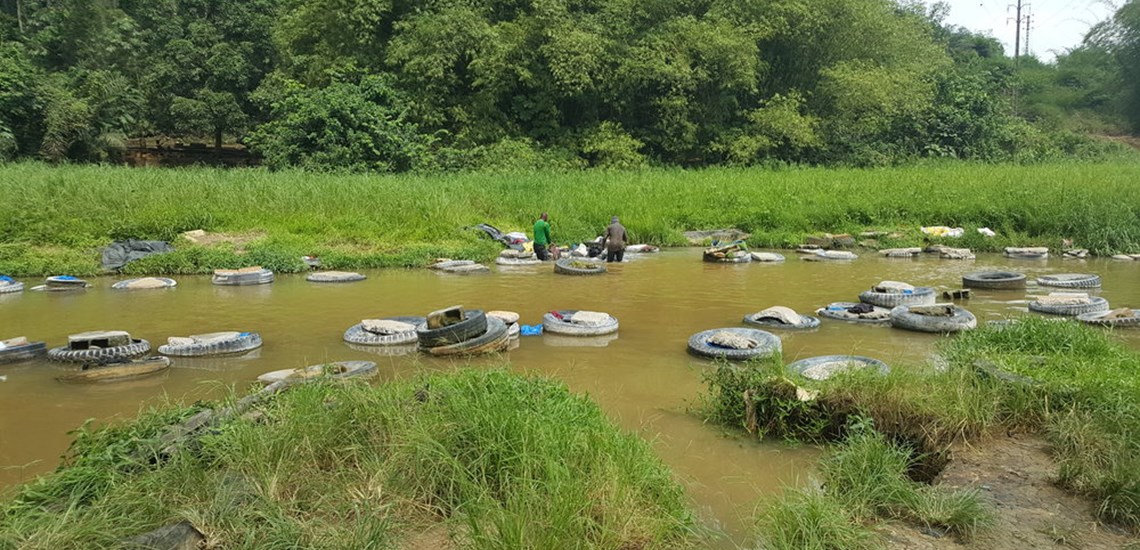Tyre dealers in Ivory Coast must self-regulate or face a ban on their operations. They must act to clear up the city streets which have become tyre dumps.
Waste Tyre Issues Growing Concern in the Ivory Coast
The Mayors’ offices of the Ivory Coast cities of Abidjan and Treichville have realised that they have to face up to the issue of waste tyres being dumped all around the urban areas of their cities. In response, they are looking at how the waste tyre sector can best be managed through strategies developed by the Mayors’ offices and NGOs.
The Town Hall, through the Technical Services and Environment Department, has appointed Heads of Hygiene and Office Services, for maintenance and hygiene issues. Messrs. Angaman Eba, Raux Yao and Kassi Paul explained the role of the Town Hall and the actions carried out.
“Historically, Treichville is the nerve centre of many repair and retread shops. There are some 300 people involved in the sector. It is a lucrative business.
“There is also the proximity of the Autonomous Port of Abidjan. Most tyre containers coming from Europe thus pass through Treichville.
“The unloading of its containers is done directly in the commune. In the course of their activities, the vulcanisers sort out the serviceable tyres from the scrap tyres. When they finish, these importers dump the scrap in the streets.”
Another significant factor in the presence of scrap tyres in the municipality is the replacement market. It is in Treichville that most Abidjan people come to change their used tyres”, detailed the municipal agents. These heads of the Service and Hygiene office added that “as a Technical Service, we learned that some people in “Gbaka” (unregulated taxi service) come to dump tyres in our municipality. We have been able to apprehend these crooks and have sanctioned them with the greatest force available. All these factors contribute to increasing the number of used tyres in our commune.”
The Mayors’ offices can only do so much as the National Agency for Waste Management (ANAGED) is the regulatory authority for the waste sector in Côte d’Ivoire.
In the case of the District of Abidjan, two operators ensure the collection and treatment of waste. These are the companies ECO EBURNIE and ECOTI SA. In Treichville, it is ECO EBURNIE that is in charge. However, these operations only deal with household waste. Industrial waste must be disposed of by the producers themselves.
It is for this reason that the Mayors have made a decree to organise the structure,” said the Heads of Hygiene and Office Services. Subsequently, they stressed that “the City Council asked the vulcanisers to join together in an association to be more efficient in the management of used tyres. This has resulted in the establishment of an association to fight against used tyre dumping in the municipality.
In late October 2019 at there was a meeting of vulcanisers from the two cities and the surrounding area. The president of the Treichville association called for unity and responsibility for the problem to be recognised by the sector.
In his speech, he thanked the authorities for allowing the vulcanisers to operate and admitted that they were the victims of their own success. However, they had to work with the authorities to organise their sector.
The Mayors’ offices have created bylaws that allow the vulcanisers to regulate the market locally. He made it clear; if the sector did not become organised and adequately deal with its waste tyres, there would be a complete ban placed upon their business operations.
Two rules had been agreed with the authorities. The first was a ban on the placing of stocks of tyres out in front of the tyre shops, and secondly, all tyre vulcanisers now need to be registered with the Mayors’ offices.
Continuing, the association president Bakayoko Losseni asked the members of his association to raise funds for a better organisation to rid the municipality of scrap tyres “We are about 300 vulcanisers in the city. For some time, we have been asked to contribute to remove scrap tyres from the municipality. From now on, we will go to the sanction phase if some do not want to participate. We will do it for ourselves. What we are asking our authorities is a site and a truck to pick up used tyres. It is in unity and understanding that we will be able to meet all the challenges.”


















